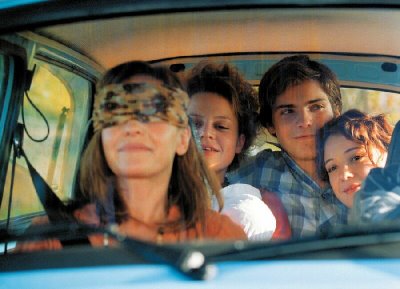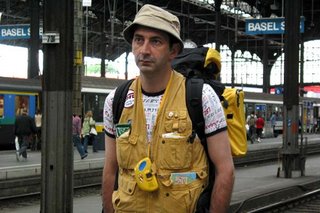
 For once, some comedy based on the War.
For once, some comedy based on the War.
By JASON ANDERSON
A charming tragicomedy about a young man's tireless efforts to spare his ailing mother some unfortunate news about the Berlin Wall, Good Bye, Lenin! was more than a hit movie when released in its native
Alex (Daniel Brühl) and Ariane (Maria Simon) live with their mother, Christiane (Katrin Sass), in
Good Bye, Lenin!'s often hilarious but essentially melancholy tale of a family getting trampled by the march of history struck a chord with German viewers and commentators, most of whom are just beginning to get some perspective on the shotgun wedding that occurred between the two
A veteran television and film director who co-founded
With a sparkling score by Yann Tiersen (Amélie) and a careful balance of whimsy and pathos, Becker's film is very engaging. Though lightweight as a political satire, Good Bye, Lenin! manages the tricky task of generating sympathy for the citizens while ridiculing the state. "The people who had to live in the GDR are something completely different than the system of the GDR," says Becker. "I think it was right that the GDR broke down because it was a perversion of the socialist ideal. For the word 'democratic' to be in GDR was just ridiculous. They took it seriously in the beginning but forgot it very fast. But people like Christiane always remembered the good intentions and were hoping the politics would come back. And the government kept telling people, 'Socialism is the superior system, even if you can't see that right now. Just wait another 10 years.' It's like the Catholic church saying, 'It's very bad on Earth but if you come to Heaven, everything will improve... as long as you do what we say.'"
What Good Bye, Lenin! mocks is not Christiane's faith but the system that demanded it. Alex's well-intentioned but absurd conspiracy to dupe his mother reveals how deeply he was influenced by that system as well. An equal-opportunity satirist, Becker -- a West German native who has lived in
Nevertheless, the director insists that his film "is not a matter of systems. It's just that there were a lot of interesting, intelligent people and good characters living in the GDR. And they have a right to have their positive memories, even if these memories come from a country and a time of dictatorship. It's not good to tell people they lived their lives in vain only because they had the bad luck to live under the wrong circumstances."


